牛津译林8下Unit 1 Past and present 单元自主测试题(含答案)
文档属性
| 名称 | 牛津译林8下Unit 1 Past and present 单元自主测试题(含答案) | 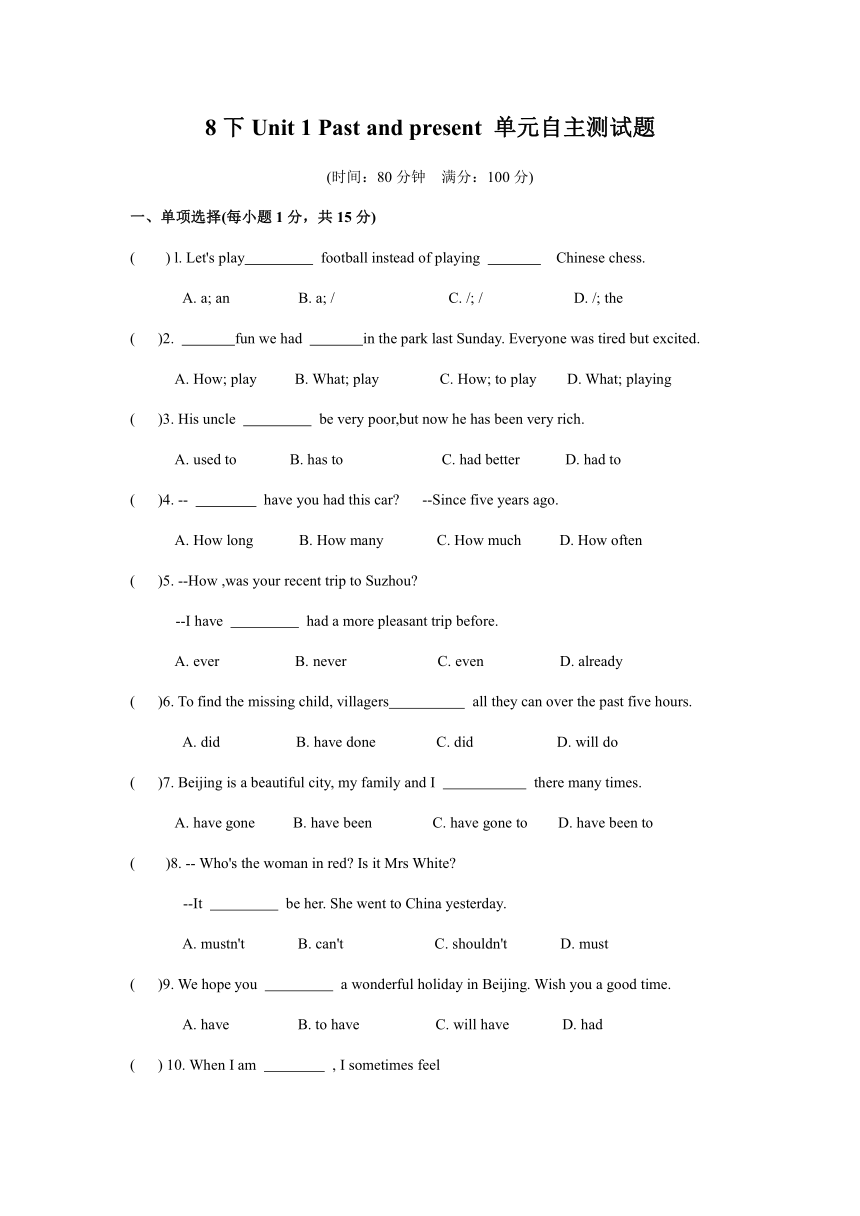 | |
| 格式 | zip | ||
| 文件大小 | 92.5KB | ||
| 资源类型 | 教案 | ||
| 版本资源 | 牛津译林版 | ||
| 科目 | 英语 | ||
| 更新时间 | 2020-02-02 07:32:54 | ||
图片预览

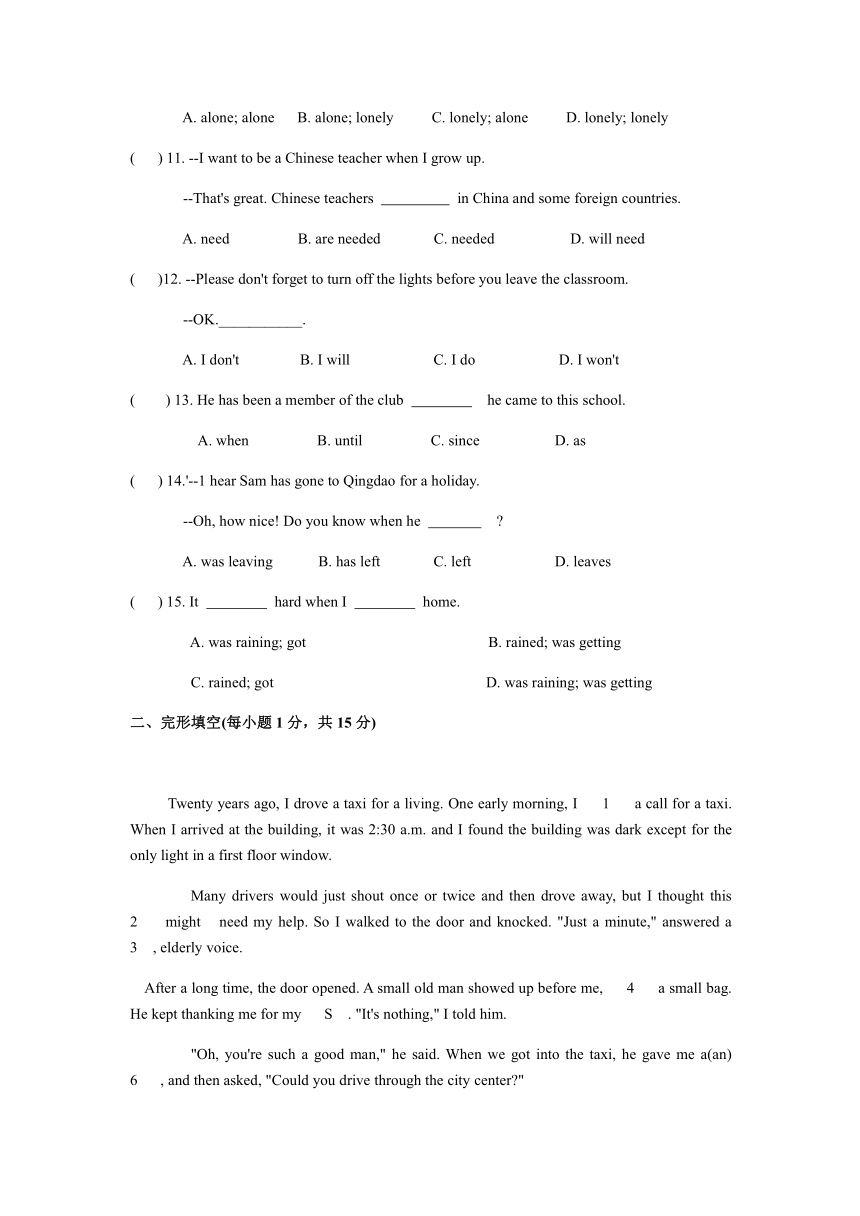
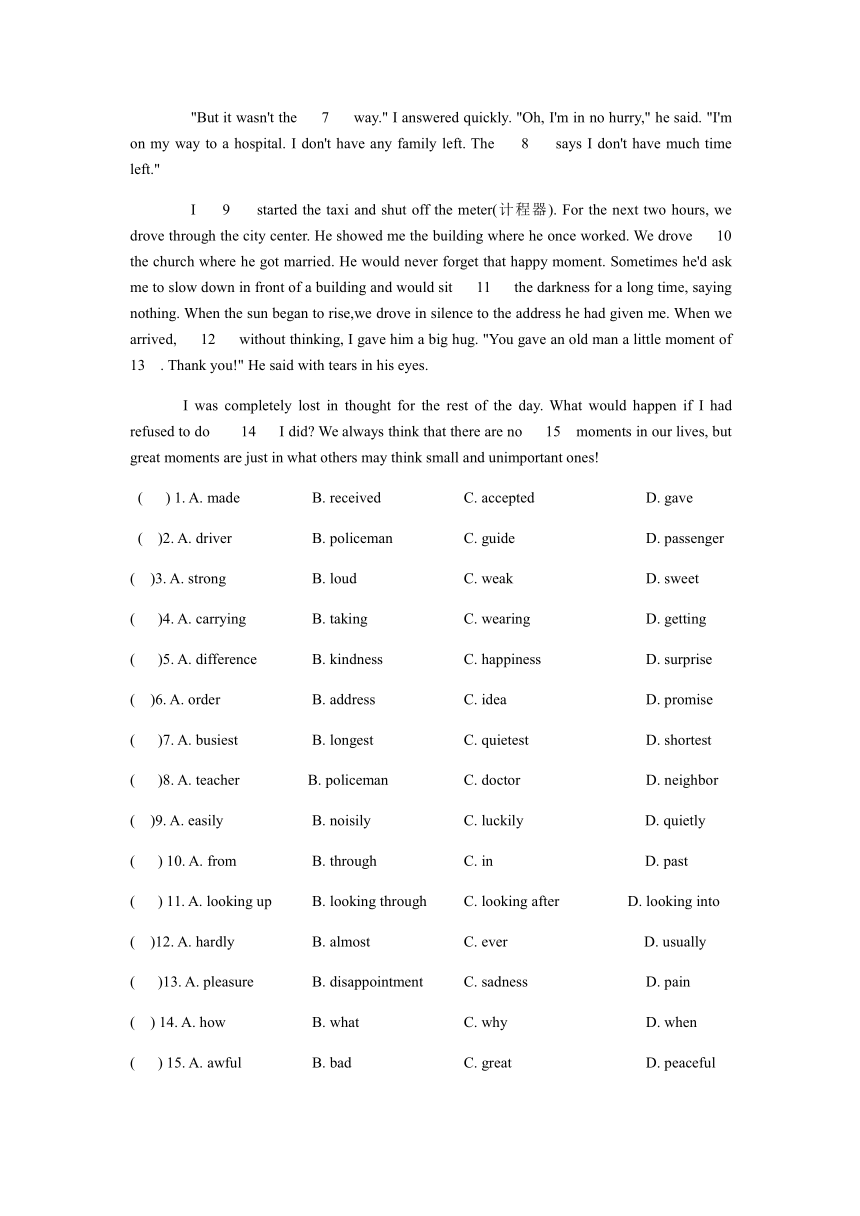
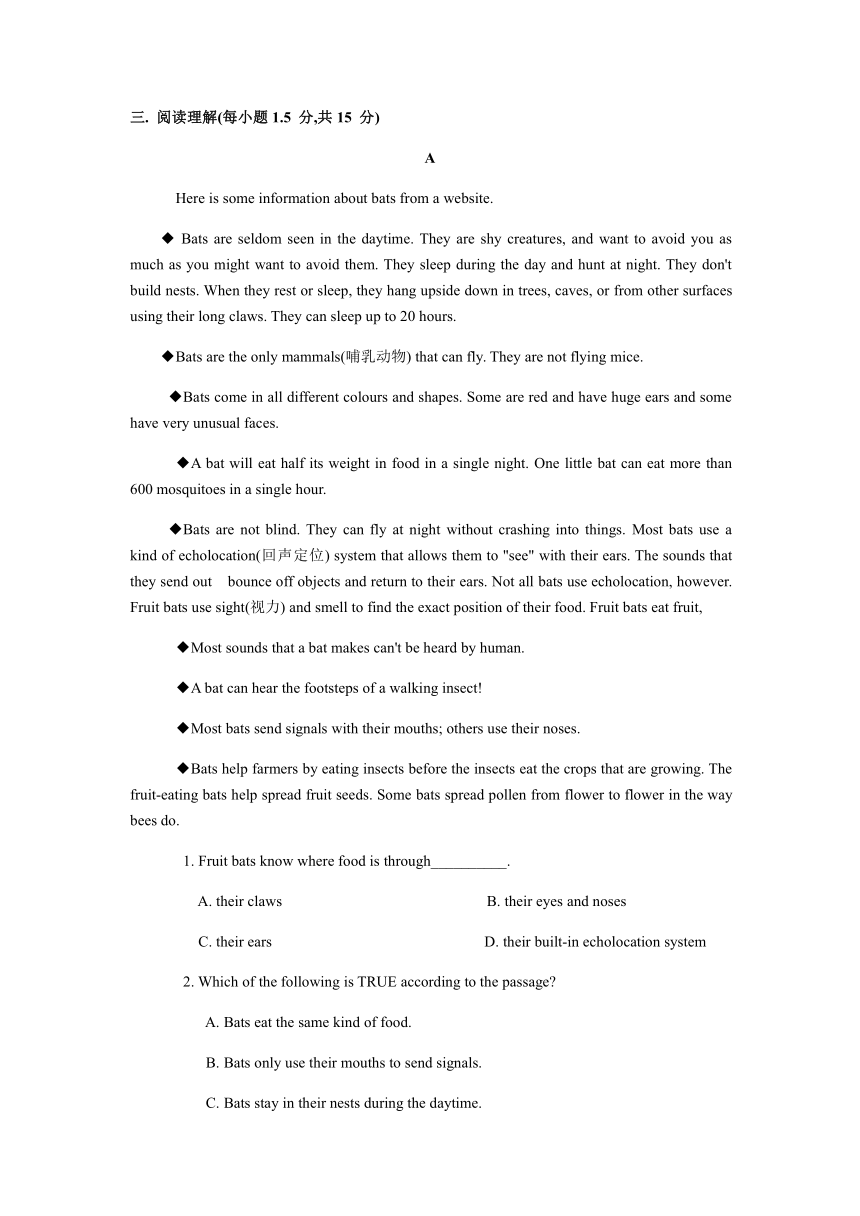
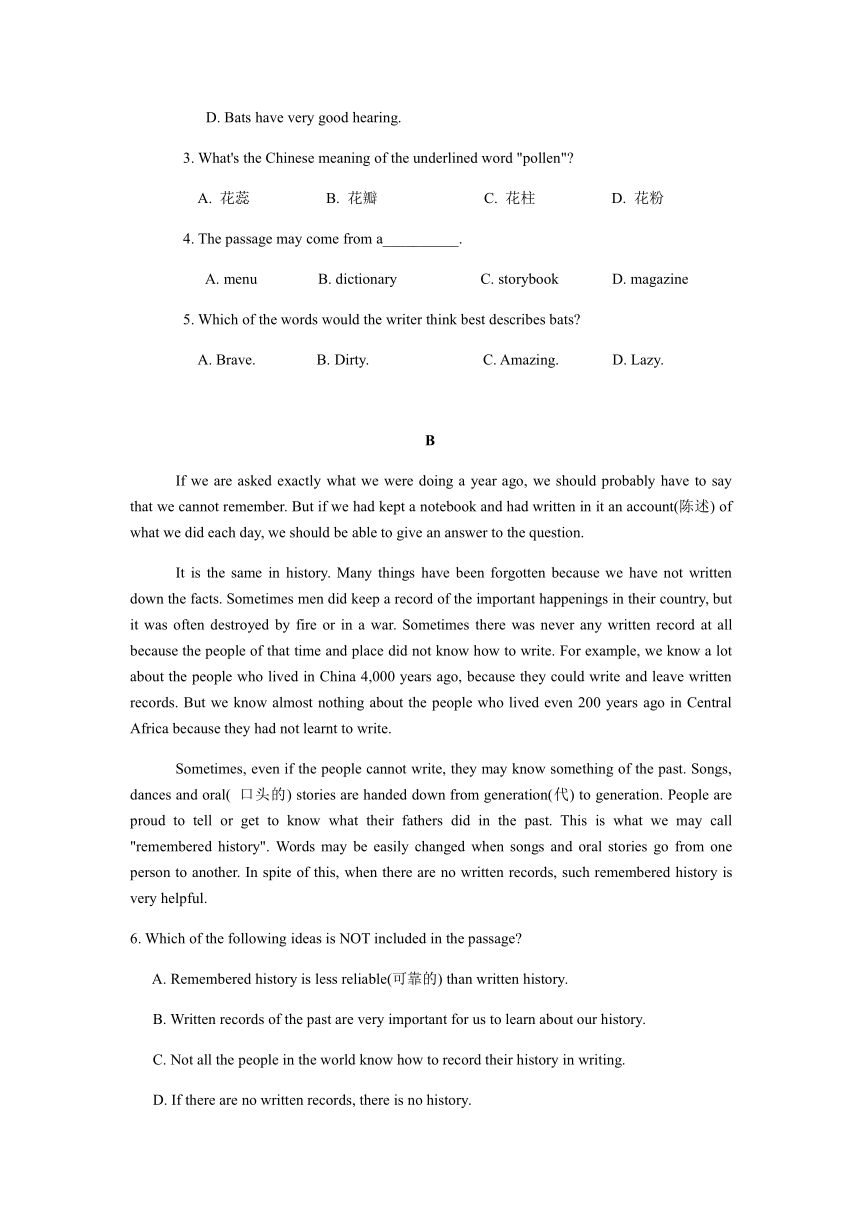
文档简介
8下Unit 1 Past and present 单元自主测试题
(时间:80分钟 满分:100分)
一、单项选择(每小题1分,共15分)
( ) l. Let's play football instead of playing Chinese chess.
A. a; an B. a; / C. /; / D. /; the
( )2. fun we had in the park last Sunday. Everyone was tired but excited.
A. How; play B. What; play C. How; to play D. What; playing
( )3. His uncle be very poor,but now he has been very rich.
A. used to B. has to C. had better D. had to
( )4. -- have you had this car? --Since five years ago.
A. How long B. How many C. How much D. How often
( )5. --How ,was your recent trip to Suzhou?
--I have had a more pleasant trip before.
A. ever B. never C. even D. already
( )6. To find the missing child, villagers all they can over the past five hours.
A. did B. have done C. did D. will do
( )7. Beijing is a beautiful city, my family and I there many times.
A. have gone B. have been C. have gone to D. have been to
( )8. -- Who's the woman in red? Is it Mrs White?
--It be her. She went to China yesterday.
A. mustn't B. can't C. shouldn't D. must
( )9. We hope you a wonderful holiday in Beijing. Wish you a good time.
A. have B. to have C. will have D. had
( ) 10. When I am , I sometimes feel
A. alone; alone B. alone; lonely C. lonely; alone D. lonely; lonely
( ) 11. --I want to be a Chinese teacher when I grow up.
--That's great. Chinese teachers in China and some foreign countries.
A. need B. are needed C. needed D. will need
( )12. --Please don't forget to turn off the lights before you leave the classroom.
--OK.___________.
A. I don't B. I will C. I do D. I won't
( ) 13. He has been a member of the club he came to this school.
A. when B. until C. since D. as
( ) 14.'--1 hear Sam has gone to Qingdao for a holiday.
--Oh, how nice! Do you know when he ?
A. was leaving B. has left C. left D. leaves
( ) 15. It hard when I home.
A. was raining; got B. rained; was getting
C. rained; got D. was raining; was getting
二、完形填空(每小题1分,共15分)
Twenty years ago, I drove a taxi for a living. One early morning, I 1 a call for a taxi. When I arrived at the building, it was 2:30 a.m. and I found the building was dark except for the only light in a first floor window.
Many drivers would just shout once or twice and then drove away, but I thought this 2 might need my help. So I walked to the door and knocked. "Just a minute," answered a 3 , elderly voice.
After a long time, the door opened. A small old man showed up before me, 4 a small bag. He kept thanking me for my S . "It's nothing," I told him.
"Oh, you're such a good man," he said. When we got into the taxi, he gave me a(an) 6 , and then asked, "Could you drive through the city center?"
"But it wasn't the 7 way." I answered quickly. "Oh, I'm in no hurry," he said. "I'm on my way to a hospital. I don't have any family left. The 8 says I don't have much time left."
I 9 started the taxi and shut off the meter(计程器). For the next two hours, we drove through the city center. He showed me the building where he once worked. We drove 10 the church where he got married. He would never forget that happy moment. Sometimes he'd ask me to slow down in front of a building and would sit 11 the darkness for a long time, saying nothing. When the sun began to rise,we drove in silence to the address he had given me. When we arrived, 12 without thinking, I gave him a big hug. "You gave an old man a little moment of 13 . Thank you!" He said with tears in his eyes.
I was completely lost in thought for the rest of the day. What would happen if I had refused to do 14 I did? We always think that there are no 15 moments in our lives, but great moments are just in what others may think small and unimportant ones!
( ) 1. A. made B. received C. accepted D. gave
( )2. A. driver B. policeman C. guide D. passenger
( )3. A. strong B. loud C. weak D. sweet
( )4. A. carrying B. taking C. wearing D. getting
( )5. A. difference B. kindness C. happiness D. surprise
( )6. A. order B. address C. idea D. promise
( )7. A. busiest B. longest C. quietest D. shortest
( )8. A. teacher B. policeman C. doctor D. neighbor
( )9. A. easily B. noisily C. luckily D. quietly
( ) 10. A. from B. through C. in D. past
( ) 11. A. looking up B. looking through C. looking after D. looking into
( )12. A. hardly B. almost C. ever D. usually
( )13. A. pleasure B. disappointment C. sadness D. pain
( ) 14. A. how B. what C. why D. when
( ) 15. A. awful B. bad C. great D. peaceful
三. 阅读理解(每小题1.5 分,共15 分)
A
Here is some information about bats from a website.
◆ Bats are seldom seen in the daytime. They are shy creatures, and want to avoid you as much as you might want to avoid them. They sleep during the day and hunt at night. They don't build nests. When they rest or sleep, they hang upside down in trees, caves, or from other surfaces using their long claws. They can sleep up to 20 hours.
◆Bats are the only mammals(哺乳动物) that can fly. They are not flying mice.
◆Bats come in all different colours and shapes. Some are red and have huge ears and some have very unusual faces.
◆A bat will eat half its weight in food in a single night. One little bat can eat more than 600 mosquitoes in a single hour.
◆Bats are not blind. They can fly at night without crashing into things. Most bats use a kind of echolocation(回声定位) system that allows them to "see" with their ears. The sounds that they send out bounce off objects and return to their ears. Not all bats use echolocation, however. Fruit bats use sight(视力) and smell to find the exact position of their food. Fruit bats eat fruit,
◆Most sounds that a bat makes can't be heard by human.
◆A bat can hear the footsteps of a walking insect!
◆Most bats send signals with their mouths; others use their noses.
◆Bats help farmers by eating insects before the insects eat the crops that are growing. The fruit-eating bats help spread fruit seeds. Some bats spread pollen from flower to flower in the way bees do.
1. Fruit bats know where food is through__________.
A. their claws B. their eyes and noses
C. their ears D. their built-in echolocation system
2. Which of the following is TRUE according to the passage?
A. Bats eat the same kind of food.
B. Bats only use their mouths to send signals.
C. Bats stay in their nests during the daytime.
D. Bats have very good hearing.
3. What's the Chinese meaning of the underlined word "pollen"?
A. 花蕊 B. 花瓣 C. 花柱 D. 花粉
4. The passage may come from a__________.
A. menu B. dictionary C. storybook D. magazine
5. Which of the words would the writer think best describes bats?
A. Brave. B. Dirty. C. Amazing. D. Lazy.
B
If we are asked exactly what we were doing a year ago, we should probably have to say that we cannot remember. But if we had kept a notebook and had written in it an account(陈述) of what we did each day, we should be able to give an answer to the question.
It is the same in history. Many things have been forgotten because we have not written down the facts. Sometimes men did keep a record of the important happenings in their country, but it was often destroyed by fire or in a war. Sometimes there was never any written record at all because the people of that time and place did not know how to write. For example, we know a lot about the people who lived in China 4,000 years ago, because they could write and leave written records. But we know almost nothing about the people who lived even 200 years ago in Central Africa because they had not learnt to write.
Sometimes, even if the people cannot write, they may know something of the past. Songs, dances and oral( 口头的) stories are handed down from generation(代) to generation. People are proud to tell or get to know what their fathers did in the past. This is what we may call "remembered history". Words may be easily changed when songs and oral stories go from one person to another. In spite of this, when there are no written records, such remembered history is very helpful.
6. Which of the following ideas is NOT included in the passage?
A. Remembered history is less reliable(可靠的) than written history.
B. Written records of the past are very important for us to learn about our history.
C. Not all the people in the world know how to record their history in writing.
D. If there are no written records, there is no history.
7. We know very little about Central Africa 200 years ago because___________.
A. there was nothing worth writing down at that time
B. the people there paid no attention to the importance of keeping a record
C. the written records were destroyed by fire
D. the people there did not know how to write
8. Remembered history refers to_____________.
A. history based on a person's imagination
B. stories of important happenings passing down from mouth to mouth
C. songs and dances about the most important events
D. both B and C
9. Remembered history is considered as valuable only when________.
A. it is written down B. there is no written records
C. it proves to be true D. people are interested in it
10. The passage suggests that we could have learnt much more about our past than we do now if the ancient people had__________.
A. kept a record of every past event
B. not destroyed their written records in wars
C. told the exact stories of the most important happenings
D. made more songs and dances
四、词汇运用(每小题1分,共10分)
A.根据句子意思及括号中所给汉语提示填空。
1. Finally, he____________ (意识到]) that it was his fault to fight with Jack.
2. Most of my classmates have never been to the UK or the USA ___________ (以前).
3. Now there are a number of _______________ (工厂) in our hometown.
4. The road was too________ (狭窄的) for me to turn back the air-conditioner.
5. Now the children's study_____________ ( 条件) is much better than before.
B.根据句子意思,用括号中所给单词的适当形式填空。
1.--Have you heard from your parents ___________ (recent)? --Yes. I got one last week.
2. The air __________ (pollute) is still a big problem in many areas in our country.
3. When I got to the classroom, the whole class___ (discuss) where to spend the coming weekend.
4. This year's basketball final (take) place in two weeks.
5. The old man usually relaxes himself by (play) chess with his friend.
五、任务型阅读(每小题1分,共10分)
Hongbao, or the red packet, is simply a red envelope(信封) with gift money inside. It is a tradition in China, and it has had a long history. Kids can always receive red packets from their parents, grandparents and other relatives during the Spring Festival. People think the red packet can bring them good luck.
These years, however, the tradition is going high-tech. The red packet has turned into
electronic(电子的) hongbao on the mobile phone. During the important festivals, people send electronic hongbao to their family members and friends by WeChat, QQ and so on.
Electronic hongbao makes people closer to each other. You can send electronic hongbao to others no matter how far they are. People won't care how much money you give them. They will feel warm because you still remember and care about them. Electronic hongbao also brings fun to people. People can send it anywhere at any time. They may get electronic hongbao in surprise.
However, electronic hongbao may also be bad. People may spend all their free time grabbing electronic hongbao and care less about their life and people around them.
The red packet
The traditional one Red packets 1 gift money in them.Children can 2 red packets from the adult.It's 3 for children to get red packets during the Spring Festival.
The electronic one Now many people prefer to send electronic hongbao 4 of the traditional one.People can get electronic hongbao 5 WeChat, QQ and so on.Be good:◆It makes people 6 and feel 7 ◆It makes people's life full of 8 --people can 9 others by sending electronic hongbao.Be bad:People may care more about grabbing electronic hongbao 10 people around them.
1. _________ 2.___________ 3._____________ 4._______________ 5 .___________
6. _________ 7.___________8._____________9.________________ 10.____________
六、首字母填空(每小题1分,共10分)
In the 1930s, Dan West was farming in Spain. It was wartime, and people were starving(挨饿). An i 1 hit him as he handed out cups of milk to children. "These children don't need a cup. They need a cow." This was the b 2 of Heifer International.
Heifer International gives different k 3 of gifts. Its gifts might say "quack" or "moo". Dan West asked friends in the United States to give gifts of heifers(小母牛), or young cows. S 4 then, Heifer International has given animals to four million families. It gives people the chance to f 5 themselves.
Heifer International wants the people they help to help others. For one project, the group s 6 chickens to some children in Asia. The children yearned for(向往) the day when they could help others. Nine-year-old Julie knew she had to look after her chickens w 7 so they would produce new eggs and healthy chicks. She t 8 good care of them, and they gave birth to strong, healthy chicks. Julie then passed on the gift of chicks to other families.
Because of Heifer International, children can s 9 their days in a schoolhouse instead of working in the fields. They can use the money they earn from their animals to pay for school. Heifer International has made a huge d l0 to people's lives for many years. People should be grateful to a kindhearted farmer named Dan West.
2. _________ 2.___________ 3._____________ 4._______________ 5 .___________
7. _________ 7.___________8._____________9.________________ 10.____________
七、翻译句子(每小题2分,共10分)
1.我爷爷奶奶一辈子都生活在农村。
______________________________________________________________________
2.这里的人们正过着一种富有且幸福的生活。
______________________________________________________________________
3.自从我们上次见面,已经过去三周了。
______________________________________________________________________
4.你通过在网上聊天与他保持联系吗?
_______________________________________________________________________
5.这家老的电影院已经变成了一家大型超市。
_______________________________________________________________________
八、书面表达(共15分)
假设你是李华,上个月你回到了家乡,发现变化很大。请根据以下提示写一篇题为“Changesin My Hometown”的短文。要点提示如下:
1.我的家乡过去是个安静的小镇,山清水秀,空气清新。人们出行骑自行车或步行。
2.现在我的家乡已变成一个现代化的城镇,已建起座座高楼,处处可见宽阔的马路。我们住的小区门口有许多公交车经过,很多家庭都已买了私家车,出行很方便。
3.但是,家乡的变化也给我们带来了许多麻烦,例如……
4.你的想法是:…
Changes in My Hometown
When I returned to my hometown last month, I found it changed a lot.__________________
________________________________________________________________________________________________________________________________________________________________________________________________________________________________________________________________________________________________________________________________________________________________________________________________________________________________________________________________________________________
Unit 1 自主测试答案:
一,1.C 2. D 3. A 4. A 5. B 6, B 7. B 8. B 9. C
10. B 11. B 12. D 13. C 14. C 15. A
二,1.B 2. D 3. C 4. A 5. B 6. B 7. D 8. C 9. D
10. D ll.D 12. B 13. A 14. B 15. C
三.1.B 2. D 3. D 4. D 5. C 6. D 7. D 8. D 9. B 10. A
四, A. 1. realized 2. before 3. factories 4. narrow 5. condition
B.l.reeently 2. pollution 3. were discussing 4. will take 5. playing
五, 1. have 2. receive/get 3. lucky 4. instead 5. by/through
6. closer 7. warm 8. fun 9. surprise 10. than
六,1. idea 2. beginning 3. kinds 4. Since 5. feed 6. sent
7. well 8. took 9. spend 10. difference
七,1. My grandparents lived in the countryside all their lives
2. People here are having/enjoying a rich and happy life
3. It is three weeks since we met with each other last time
4. Do you keep in touch with him by chatting on the Internet
5. The old cinema has already turned into a big supermarket
八, One possible version:
Changes in My Hometown
When I returned to my hometown last month, I found it changed a lot.
My hometown used to be a quiet small town. There were green hills and clean water. The air was fresh. People went around by bike or on foot. But now it has become a modern town. There are many tall buildings and you can see wide roads everywhere. Many buses drive past our community every day. And many people have bought their own cars, so it's easy to travel around. However, the changes of my hometown have also brought us a lot of trouble. For example, the water is not as clean as before. I think we should work together to make our environment much better.
